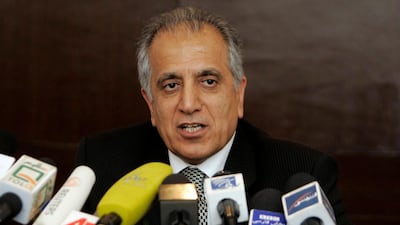The Taliban said it will hold further talks with the United States on ending the 17-year war in Afghanistan after meeting a US delegation on Friday.
The US side was led by the recently appointed Special Representative for Afghanistan Reconciliation Zalmay Khalilzad, an Afghan-born former US ambassador to Kabul, while the Taliban was represented by top officials of its political office in the Qatari capital, Taliban spokesman Zabiullah Mujahid told The National.
“The representatives of the Islamic Emirate [Afghanistan] identified the presence of foreign forces as the greatest obstacle obstructing true peace and solving problems, adding that Afghanistan is an Islamic country and has its own Islamic values and culture," he said.
"Keeping that in mind, efforts must be made towards a true and intra-Afghan solution. At the end both sides agreed to continue holding meetings in the future.”
The US delegation agreed to discuss a US withdrawal from Afghanistan in further meetings, a Taliban commander told The National.
There was no confirmation of the talks from the US, although a top Afghan government official told The National it was an "initial meeting to discuss peace" while refusing to disclose details.
Mr Khalilzad did not mention the meeting in a statement released through the US embassy in Kabul, where he returned on Saturday after travelling to Pakistan, the UAE, Saudi Arabia and Qatar.
“The United States shares the aspirations of all Afghans for a peaceful Afghanistan where all Afghans see themselves included," he said. "All citizens of Afghanistan must be a part of this reconciliation process.”
Mr Khalilzad did not immediately respond to requests for comment from The National. The US State Department was unavailable for comment before time of going to press.
The Taliban spokesman said its six-member negotiating team was made up of Al Haj Sher Muhammad Abbas Stanikzai, the head of its political office; his deputy Mawlawi Abdul Salam Hanafi; and office members Sheikh Shahabuddin Delawar, Qari Deen Muhammad Hanif, Al Haj Muhammad Zahid Ahmadzai and Muhammad Sohail Shaheen.
_______________
Read more:
Pakistan gives green light to Saudi inclusion in Afghan peace talks
Youth wave challenges Afghan elections
Afghan voters to get a giant ballot paper in Kabul
_______________
The Taliban political office in Doha was opened in 2013 at the US request to initiate peace talks. The Taliban say they held direct talks with US officials for the first time in July, including with Alice Wells, the senior official for the State Department's Bureau of South and Central Asian Affairs.
The Taliban insist that the presence of foreign troops in Afghanistan is the biggest hurdle to achieving peace in the country. There are 14,000 US troops in Afghanistan to provide training and support the Afghan forces after US President Donald Trump increased their numbers last year under a new strategy to counter the insurgents.
Despite taking tentative steps towards a peace process, the Taliban continue to attack Afghan security forces, with at least 17 soldiers reported killed and 11 other abducted from an army camp in the western Farah province on Sunday.
Last Monday, a day after Mr Khalilzad arrived in Kabul for his first visit since being appointed, the insurgents repeated their threat to disrupt parliamentary elections next week, which are already three years overdue, and urged Afghans not to take part
"Khalilzad's meetings with the Taliban are an indication that efforts toward launching a peace process are slowly but finally headed in the right direction. But these efforts still remain in the 'talks about talks' phase. Until the Taliban gets an offer it can't refuse, it has little incentive to stop fighting a war it believes it's winning," Michael Kugelman, a senior associate for South and South-East Asia at the Washington-based Woodrow Wilson Center for Scholars, told The National.
“The good news is that there’s never been a better opportunity. The Taliban’s brief truce earlier this year shows it’s willing to support peace. And the US willingness, with approval from Kabul, to speak directly with the Taliban means that a key Taliban precondition has been met," Mr Kugelman said.
"The question is, what else can the US and Afghanistan offer to the Taliban that is generous enough to the insurgents without being prohibitively risky to Washington and Kabul?"
Last week, Pakistan and the United States encouraged Saudi Arabia to join efforts to resolve the 17-year Afghan conflict through a negotiated peace and reconciliation process.
Violence in the country has been escalating in the days before the October 20 parliamentary election. Twenty-two people were killed and 36 injured in an attack on an election rally in north-eastern province of Takhar on Saturday. There was no claim of responsibility for the bombing.
The US ambassador to Afghanistan John Bass condemned the violence, and called on the Taliban to do the same. "If the group [Taliban] is serious about the peace process it will do the same and punish those responsible," he said in a tweet.
The Taliban, Afghanistan's biggest militant group, were toppled from power by US-led invasion in 2001 and have so far refused to hold peace talks with Afghan government.

